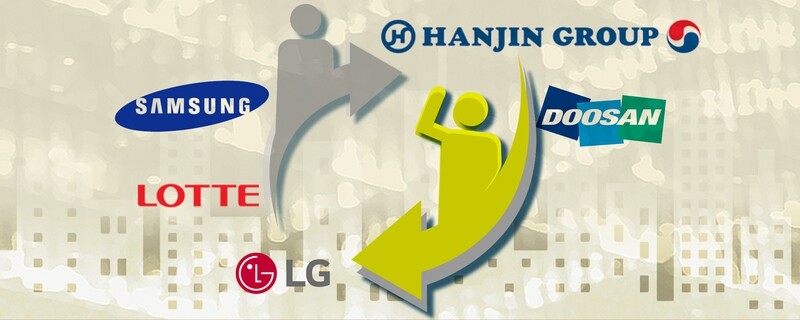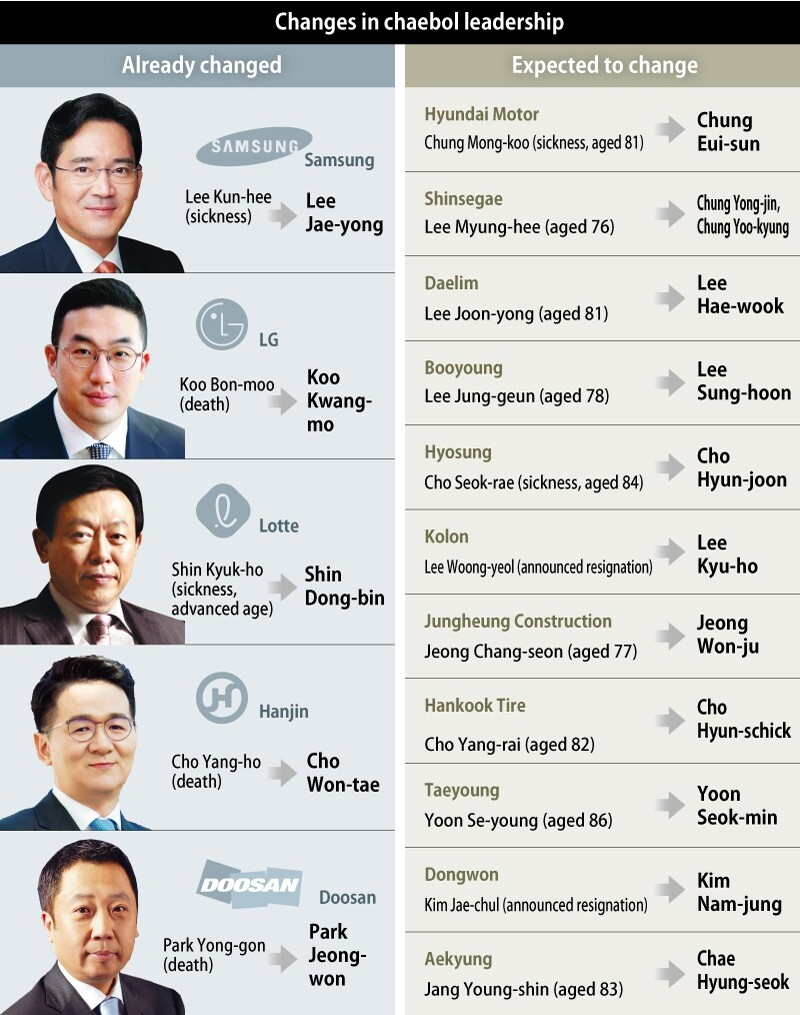hankyoreh
Links to other country sites 다른 나라 사이트 링크
Full-scale generational succession in place for S. Korea’s chaebol heads

A full-scale generational succession is taking place among the leaders of South Korea’s chaebol groups. New “same persons” (chaebol heads) have been named at LG, Hanjin, and Doosan, following similar changes at Samsung and Lotte last year. Over a dozen other groups are also estimated to be planning their own changes in the near future owing to factors including the current head’s failing health, advanced age, or declared withdrawal from management. A “same person” is a conglomerate head possessing management rights for a “business group” (chaebol) according to the Monopoly Regulation and Fair Trade Act.
The Fair Trade Commission (FTC) announced on May 15 that three business groups subject to limitations on cross shareholding with over 10 trillion won (US$8.41 billion) in assets – LG, Hanjin, and Doosan – had named a new same person. In all three cases, the reason was the death of the previous chairman. LG (fourth ranked among South Korean business groups) replaced Koo Bon-moo with Koo Kwang-mo, Hanjin (13th) replaced Cho Yang-ho with Hanjin KAL Chairman Cho Won-tae, and Doosan (15th) replaced Emeritus Chairman Park Yong-gon with Chairman Park Jeong-won.

“Because Hanjin failed to apply for a change in its leadership due to an inability to reach an agreement within the ruling family, Cho Won-tae, chairman of the holding company Hanjin KAL, was designated by authority as the identification individual according to Article 14 of the Fair Trade Act based on his being the most likely to be exercising practical governing authority,” the FTC explained. In the event that Hanjin applies to name a different leader, the FTC plans to review his or her suitability and reflect its conclusions in next year’s designation.
Advanced age and failing health in old chairpersons
Last year, the FTC designated Samsung Vice Chairman Lee Jae-yong and Lotte Chairman Shin Dong-bin as the heads of their respective groups in place of former Chairman Lee Kun-hee and Emeritus Chairman Shin Kyuk-ho. The latest changes mean the heads of five chaebol conglomerates have been replaced in the space of just two years. The changing of the guard is only expected to spread, as over 10 other chaebols are expected to designate new heads due to the failing health or advanced age of the current head. At Hyundai Motor and Hyosung, the current heads – Chairman Chung Mong-koo and Emeritus Chairman Cho Seok-rae, respectively – are both over 80 years old and in poor health. After receiving a physicians’ opinion to verify Chung’s health status, the FTC deemed him still capable of conducting normal management activities at Hyundai Motor.
Seven chaebols have heads who are over 75 years old: Shinsegae (Chairwoman Lee Myung-hee), Daelim (Chairman Lee Joon-yong), Buyoung (Chairman Lee Joong-keun), Jungheung Construction (CEO Jung Chang-sun), Hankook Tire (Chairman Cho Yang-rai), Taeyoung (Chairwoman Yoon Se-young), and Aekyung (Chairwoman Jang Young-shin). At Kolon and Dongwon, respectively, current Chairmen Lee Woong-yeol and Kim Jae-chul have declared their withdrawal from the management front lines.
Kim Seong-sam, who heads the FTC’s business group bureau, explained that the new same person designations for LG and Doosan represented “the first fourth-generation changes since the founders.”
“Following Samsung and Lotte’s designation of new same persons last year, a changing of the generational guard has been taking place,” Kim said.
FTC designates 59 chaebols subject to notice
On the same day, the FTC designated 59 business groups subject to notice (chaebols) with over 5 trillion won (US$4.21 billion) in assets. The number was down one from 60 last year, with the Aekyung Group and the Daou Kiwoom Group receiving designations for the first time while the Meritz Financial Group, Hansol, and Hanjin Heavy Industries and Construction dropped off the list. The total number of affiliated companies was up by 20 to 2,083. Business groups subject to notice bear announcement and reporting obligations for large-scale internal transactions and are subject to regulations on “fraudulent private profits” (funneling practices) by the chairman’s family.
Among the chaebols listed, the FTC designated 34 as business groups subject to limitations on cross shareholding with 10 trillion won (US$8.41 billion) or more in assets. Kakao and HDC were newly designated, increasing the total list by two from 32 last year. The number of affiliated companies increased by 89 to 1,332. Business groups subject to limitations on cross shareholding are subject to additional bans on cross-shareholding, circular equity investment, and debt guarantees and regulations limiting voting rights for affiliate shares owned by financial and insurance companies.
Among business groups, data pointed to intensifying trends of polarization and assets shifting toward the top-ranking groups. The top five chaebols – Samsung, Hyundai Motor, SK, LG, and Lotte – accounted for over half of assets and sales for all business groups subject to notice, at 54% and 57.1% respectively. They further accounted for 72.2% of net profits for the current term. Average sales for business groups (not including financial and insurance company affiliates) increased by 63 trillion won (US$53.01 billion) from 1.359 quadrillion won (US$1.14 trillion) to 1.422 quadrillion won (US$1.19 trillion), current term net profits were down by 7.7 trillion won (US$6.48 billion) from 100.2 trillion won (US$84.3 billion) to 92.5 trillion won (US$77.82 billion), indicating decreasing profitability.
By Kwack Jung-soo, business correspondent
Please direct comments or questions to [english@hani.co.kr]

Editorial・opinion
![[Editorial] Penalties for airing allegations against Korea’s first lady endanger free press [Editorial] Penalties for airing allegations against Korea’s first lady endanger free press](https://flexible.img.hani.co.kr/flexible/normal/500/300/imgdb/original/2024/0502/1817146398095106.jpg) [Editorial] Penalties for airing allegations against Korea’s first lady endanger free press
[Editorial] Penalties for airing allegations against Korea’s first lady endanger free press![[Editorial] Yoon must halt procurement of SM-3 interceptor missiles [Editorial] Yoon must halt procurement of SM-3 interceptor missiles](https://flexible.img.hani.co.kr/flexible/normal/500/300/imgdb/child/2024/0501/17145495551605_1717145495195344.jpg) [Editorial] Yoon must halt procurement of SM-3 interceptor missiles
[Editorial] Yoon must halt procurement of SM-3 interceptor missiles- [Guest essay] Maybe Korea’s rapid population decline is an opportunity, not a crisis
- [Column] Can Yoon steer diplomacy with Russia, China back on track?
- [Column] Season 2 of special prosecutor probe may be coming to Korea soon
- [Column] Park Geun-hye déjà vu in Yoon Suk-yeol
- [Editorial] New weight of N. Korea’s nuclear threats makes dialogue all the more urgent
- [Guest essay] The real reason Korea’s new right wants to dub Rhee a founding father
- [Column] ‘Choson’: Is it time we start referring to N. Korea in its own terms?
- [Editorial] Japan’s rewriting of history with Korea has gone too far
Most viewed articles
- 1[Editorial] Penalties for airing allegations against Korea’s first lady endanger free press
- 2Months and months of overdue wages are pushing migrant workers in Korea into debt
- 3In rejecting statute of limitations defense in massacre case, Korean court faces up to Vietnam War a
- 4Historic court ruling recognizes Korean state culpability for massacre in Vietnam
- 5“Those souls can rest now”: Vietnam massacre survivor reacts to Korean court win
- 6[Editorial] Verdict on Korea’s massacre in Vietnam a first step in atonement
- 7Ruling on Korean atrocity in Vietnam comes 23 years after Hankyoreh 21’s exposé
- 81 in 3 S. Korean security experts support nuclear armament, CSIS finds
- 9[Interview] Continuing the fight for victims of civilian massacres during Vietnam War
- 10Korea’s atrocities in Vietnam, in the words of those who saw and survived them